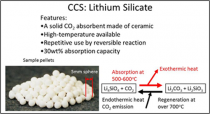Techniques for separation and recovery of CO2 using lithium silicate

- researcher's name
- affiliation
- research field
-
Thermal engineering,Energy engineering,Catalyst/Resource chemical process
- keyword
-
background
The shift to renewable energy such as wind and solar power is important for the realization of a society not dependent on fossil fuels. However, this poses a number of problems such as concerns over the introduction of large amounts of power in a short space of time and maintaining a stable supply. As such we must both increase efficiency in thermal power generation and consider the application of CCS (=CO2 Capture and Storage) to control the release of CO2 into the atmosphere, in the immediate future.
summary
“Lithium silicate” (Li4SiO4), developed by Toshiba, is a solid absorption material that can be used repeatedly to absorb CO2 at 600º and release CO2 at over 800º. It has excellent properties, such as higher absorption speed in the presence of water vapor, the ability to separate and recover pure CO2 by thermal swing operation at around 200º, and absorption capacity as high as 30% of its own weight.
application/development
Because its reaction temperature is close to the exhaust temperature of heat engines and the operating temperature of high-temperature-operating fuel cells, it is well suited for use as a temporary storage medium for dispersed power. Furthermore, for pre-combustion separation, it can be combined with hydrogen purification by hydrocarbon reformation and coal gasification reactions, and thereby adapted to systems for the combined production of power and materials, that integrate the use of heat generation during absorption.
predominance
Compared to chemical absorption liquids based on amines and other materials, it is a stable ceramic at normal temperature and in air after absorption, and is therefore easy to store for long periods. Meanwhile, its CO2 absorption capacity is much higher than solid physical absorption materials like zeolite, so its absorption is not obstructed even in the presence of water vapor.
purpose of providing seeds
Sponsord research, Collaboration research, Technical consultation
same researcher's seeds
posted:
2014/05/21




